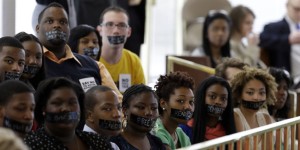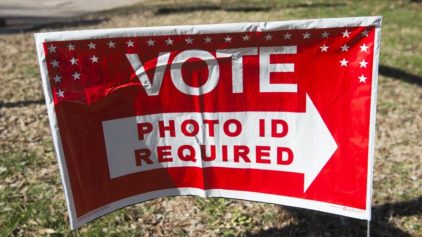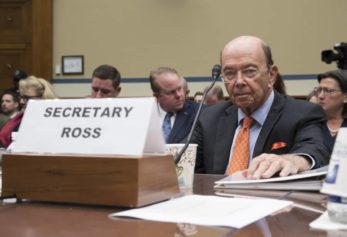
Members of North Carolina student chapters of the NAACP and opponents of voter ID legislation wear tape over their mouths while sitting silently in the gallery of the House chamber of the North Carolina General Assembly where lawmakers debated and voted on voter identification legislation in Raleigh, N.C., Wednesday, April 24, 2013. (AP Photo/Gerry Broome)
A federal judge ruled in favor of North Carolina’s infamous voter ID law, drawing criticism from civil rights advocates who say the measure discriminates against voters of color.
On Monday, U.S. district judge Thomas Schroeder dismissed lawsuits challenging changes to the state’s election laws, declaring that the challenges failed to show that it hindered voters of color from exercising their voting rights. As The Guardian reported, the judge ruled against the U.S. Department of Justice, the North Carolina NAACP and voters who claimed the purpose of the law was to discriminate against poor and minority voters, in violation of the Voting Rights Act and the Constitution.
Despite that state’s history of shutting out Black voters, Schroeder said, the plaintiffs “failed to show that such disparities will have materially adverse effects on the ability of minority voters to cast a ballot and effectively exercise the electoral franchise” due to the 2013 law.
“There is significant, shameful past discrimination. In North Carolina’s recent history, however, certainly for the last quarter century, there is little official discrimination to consider,” Schroeder wrote. The judge added that increased Black turnout in 2014 made the plaintiffs’ argument even more difficult.
Further, in his 485-page opinion, Judge Schroeder wrote that North Carolina had a “legitimate state interest” in its effort to “detect and deter fraud,” even though there is “no evidence of any [in-person voter impersonation] actually occurring.” Further, he said “a photo ID requirement promotes public confidence in the electoral system.”
“In sum, plaintiffs have failed to show that any North Carolinian who wishes to vote faces anything other than the ‘usual burdens of voting,’ ” Schroeder wrote.
The North Carolina law — which eliminated early voting, same-day voter registration and out-of-precinct voting — requires voters who go to the polls to show an acceptable form of identification such as a driver’s license, passport or military ID. Following the 2013 gutting of the Voting Rights Act by the U.S. Supreme Court in Shelby County v. Holder, GOP lawmakers in Raleigh felt emboldened to enact the legislation.
The Guardian reported that attorney Penda Hair of Advancement Project, who represents the NAACP, said the law “targets the provisions that once made North Carolina among the states with the highest turnout in the nation. This progress was especially clear among African-American and Latino voters, who came to rely on measures like early voting, same-day registration and out-of-precinct provisional ballots to ensure their voices were heard.”
Meanwhile, North Carolina Gov. Pat McCrory, who has championed the law and faces a reelection battle this year, applauded the decision.
“Common practices like boarding an airplane and purchasing Sudafed require photo ID and thankfully a federal court has ensured our citizens will have the same protection for their basic right to vote,” McCrory said in a statement. “This ruling further affirms that requiring a photo ID in order to vote is not only common-sense, it’s constitutional.”
Schroeder, a 2008 George W. Bush appointee, also had upheld the law in August 2014. According to The New York Times, the judge rejected efforts by civil rights groups and the Justice Department to block the Republican measure on the grounds that it placed “disproportionate burdens” on African-American voters. Although Schroeder had said Blacks “have reason to be wary of changes in voting law” — given North Carolina’s racist past — they would still have opportunities to vote under the less generous ballot access of the state law. The voter ID component of the law came into effect this year.
At an April 17 rally for voting rights at the U.S. Capitol in Washington, Rev. William Barber II — head of the Moral Monday movement and president of the North Carolina State Conference of the NAACP — said that 300,000 voters are negatively impacted by the North Carolina voter ID law. Further, he noted that in his home state, these voter suppression measures were enacted because they affect Black voters, who are voting in high numbers and forming coalitions with Latinos and progressive whites. Barber said voter ID and other “retrogressive” voter suppression laws — enacted by “race-driven legislatures and governors” — are the worst attack on voting rights since the 19th century.
“In the human family, every right to vote we have came through the blood of the martyrs and sacrifice,” said Barber. “And we are here to say to America, ‘Wake up! Can’t you see that it is a desecration to the memory of martyrs for the Voting Rights Act to be gutted by the Supreme Court?’… It’s a desecration of the blood for the extremist leadership of the United States Senate and the House to engage since June 25, 2013 — the day of the Shelby decision — a 1,027-day interposition filibuster — 1,025 days longer than Strom Thurmond filibustered the Civil Rights Act, they’ve filibustered fixing the Voting Rights Act.”
As Atlanta Black Star reported, a UC San Diego study has shown that voter ID laws serve to suppress voter turnout among Blacks and Latinos. Further, voter fraud — the pretext for voter ID laws — is exceedingly rare and almost nonexistent, including in North Carolina, where only two cases of voter impersonation were found out of 35 million ballots cast between 2000 and 2014.

